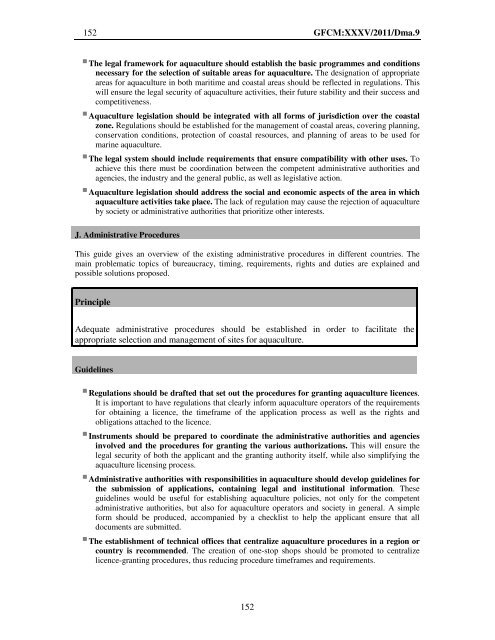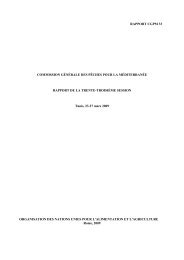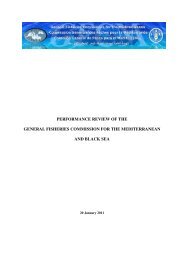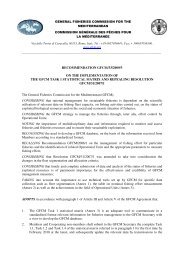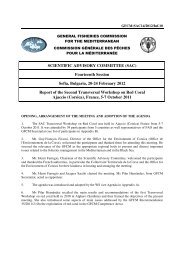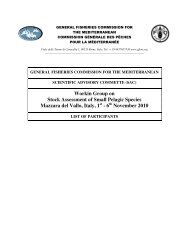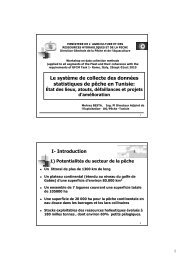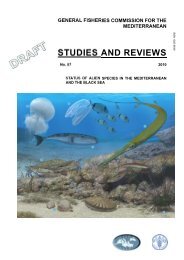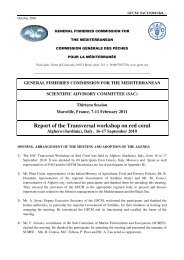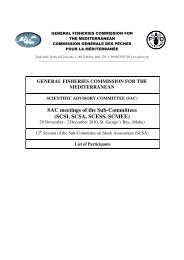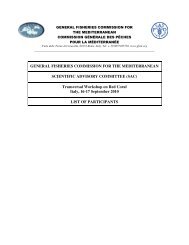Site selection and carrying capacity in Mediterranean ... - FAO Sipam
Site selection and carrying capacity in Mediterranean ... - FAO Sipam
Site selection and carrying capacity in Mediterranean ... - FAO Sipam
Create successful ePaper yourself
Turn your PDF publications into a flip-book with our unique Google optimized e-Paper software.
152 GFCM:XXXV/2011/Dma.9<br />
The legal framework for aquaculture should establish the basic programmes <strong>and</strong> conditions<br />
necessary for the <strong>selection</strong> of suitable areas for aquaculture. The designation of appropriate<br />
areas for aquaculture <strong>in</strong> both maritime <strong>and</strong> coastal areas should be reflected <strong>in</strong> regulations. This<br />
will ensure the legal security of aquaculture activities, their future stability <strong>and</strong> their success <strong>and</strong><br />
competitiveness.<br />
Aquaculture legislation should be <strong>in</strong>tegrated with all forms of jurisdiction over the coastal<br />
zone. Regulations should be established for the management of coastal areas, cover<strong>in</strong>g plann<strong>in</strong>g,<br />
conservation conditions, protection of coastal resources, <strong>and</strong> plann<strong>in</strong>g of areas to be used for<br />
mar<strong>in</strong>e aquaculture.<br />
The legal system should <strong>in</strong>clude requirements that ensure compatibility with other uses. To<br />
achieve this there must be coord<strong>in</strong>ation between the competent adm<strong>in</strong>istrative authorities <strong>and</strong><br />
agencies, the <strong>in</strong>dustry <strong>and</strong> the general public, as well as legislative action.<br />
Aquaculture legislation should address the social <strong>and</strong> economic aspects of the area <strong>in</strong> which<br />
aquaculture activities take place. The lack of regulation may cause the rejection of aquaculture<br />
by society or adm<strong>in</strong>istrative authorities that prioritize other <strong>in</strong>terests.<br />
J. Adm<strong>in</strong>istrative Procedures<br />
This guide gives an overview of the exist<strong>in</strong>g adm<strong>in</strong>istrative procedures <strong>in</strong> different countries. The<br />
ma<strong>in</strong> problematic topics of bureaucracy, tim<strong>in</strong>g, requirements, rights <strong>and</strong> duties are expla<strong>in</strong>ed <strong>and</strong><br />
possible solutions proposed.<br />
Pr<strong>in</strong>ciple<br />
Adequate adm<strong>in</strong>istrative procedures should be established <strong>in</strong> order to facilitate the<br />
appropriate <strong>selection</strong> <strong>and</strong> management of sites for aquaculture.<br />
Guidel<strong>in</strong>es<br />
Regulations should be drafted that set out the procedures for grant<strong>in</strong>g aquaculture licences.<br />
It is important to have regulations that clearly <strong>in</strong>form aquaculture operators of the requirements<br />
for obta<strong>in</strong><strong>in</strong>g a licence, the timeframe of the application process as well as the rights <strong>and</strong><br />
obligations attached to the licence.<br />
Instruments should be prepared to coord<strong>in</strong>ate the adm<strong>in</strong>istrative authorities <strong>and</strong> agencies<br />
<strong>in</strong>volved <strong>and</strong> the procedures for grant<strong>in</strong>g the various authorizations. This will ensure the<br />
legal security of both the applicant <strong>and</strong> the grant<strong>in</strong>g authority itself, while also simplify<strong>in</strong>g the<br />
aquaculture licens<strong>in</strong>g process.<br />
Adm<strong>in</strong>istrative authorities with responsibilities <strong>in</strong> aquaculture should develop guidel<strong>in</strong>es for<br />
the submission of applications, conta<strong>in</strong><strong>in</strong>g legal <strong>and</strong> <strong>in</strong>stitutional <strong>in</strong>formation. These<br />
guidel<strong>in</strong>es would be useful for establish<strong>in</strong>g aquaculture policies, not only for the competent<br />
adm<strong>in</strong>istrative authorities, but also for aquaculture operators <strong>and</strong> society <strong>in</strong> general. A simple<br />
form should be produced, accompanied by a checklist to help the applicant ensure that all<br />
documents are submitted.<br />
The establishment of technical offices that centralize aquaculture procedures <strong>in</strong> a region or<br />
country is recommended. The creation of one-stop shops should be promoted to centralize<br />
licence-grant<strong>in</strong>g procedures, thus reduc<strong>in</strong>g procedure timeframes <strong>and</strong> requirements.<br />
152


